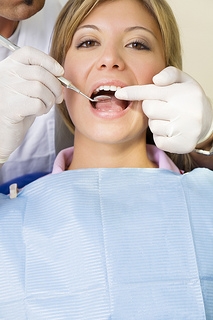How do I clean my baby’s teeth?
February 23rd, 2023

Creating good dental hygiene habits early in your child’s life is essential to the health of his or her teeth, even when your infant doesn’t have any. By starting now, you can set the foundation for your son or daughter’s oral health later on in life.
When do I start?
The best time to begin brushing your baby’s teeth is before that first tooth ever comes in. Wipe your little one’s gums gently with a soft washcloth soaked in warm water every day. Not only will this help to get rid of bacteria in the mouth, but it will also familiarize your child with a daily brushing routine.
What do I use?
When your child’s teeth begin to emerge, it’s time to switch to a baby toothbrush. Select one with a big grip for your hand and a small head that’s easy to maneuver in your baby’s mouth.
Your little one won’t need toothpaste until he or she is about a year old; and even then, only a small amount is necessary. Apply an amount the size of a grain of rice and move to a pea-sized amount when your infant is about two years old.
By around six years, your child will probably rinse and spit without your help. At this time, you may introduce a child-friendly fluoride mouthwash.
How do I do it?
Until about age five or six, it’s likely your child will still need your help with brushing teeth. Gently scrub over all the teeth and gums, even where teeth have yet to come in. It may be helpful to explain what you are doing and how you are doing it, so your toddler can learn to brush her or his teeth alone.
Paired with regular visits with Drs. Peter Vogel, Vijal Vadecha at our Anthem office, proper hygiene habits instilled in your child early on will set up a good foundation for a healthy mouth in the future.
The Link Between Dental Hygiene and Your Overall Health
February 16th, 2023

When patients of Daisy Mountain Dentistry hear any mention of oral or dental hygiene, they probably think of brushing and flossing their teeth. Although these are extremely important, the term dental hygiene encompasses much more than that. Your mouth’s health, including your teeth, has an important impact on your overall physical health. The National Institute of Dental and Craniofacial Research published the surgeon general's first ever report on dental health. It is called A National Call to Action to Promote Oral Health. In that report, the Surgeon General states that the 1948 World Health Organization expanded its earlier definition of health to "a complete state of physical, mental, and social well-being, and not just the absence of infirmity."
The Importance of Oral Health to Total Overall Health
One of the most important themes that the dental health report stressed is that you cannot be healthy without oral health. It went on to explain that oral health and general health are inextricably linked, and therefore can't be seen as two separate things. Because oral health is so critical to overall health, it should be included in all community health programs. For individuals, this means that it is just as important to take care of your mouth, your teeth, and your overall oral health as it is to take care of the rest of your body. The two most prevalent dental diseases are caries (cavities), also known as tooth decay, and periodontal (gum) disease.
Ways that Oral Health Impacts Overall Health
One important way in which good oral health contributes to better overall health is seen in the findings of several studies in which the blood sugar levels of diabetic patients were significantly lowered when their periodontal (or gum disease) was successfully treated. Your mouth has roughly 500 different species of bacteria. Many are harmless, and some are even good bacteria that help maintain the balance of your intestinal flora. Harmful bacteria can infect your gums, causing gingivitis. Your body's immune system may try to fight off the alien invaders, but they attack your gums, causing inflammation and bleeding when you brush.
Now that you know how important good dental hygiene is, be sure to see to get your teeth cleaned every six months, have regular dental checkups, brush and floss your teeth at least twice daily, and replace your toothbrush at least every couple of months. Call us to schedule your next appointment at our convenient Anthem location.
I haven’t been to the dentist in years; what should I expect?
February 16th, 2023

Time flies when we are not at the dentist! Before you know it, years may have gone by. Let’s take a moment to explain what takes place when a patient comes back to receive care after an extended period of time.
After a while, small dental concerns or issues can grow into an unexpected journey of discovery and expense. Anxiety is common and expected. Let’s discover first of all, “What brings you here today?” It is a good place to start and once the initial concerns are addressed, a comprehensive plan to restore optimum dental health can be arranged. During the first appointment Drs. Peter Vogel, Vijal Vadecha and our team want you to feel comfortable, and establish a confidence allowing you to be open with any questions.
Your visit will take approximately 90 minutes. First, a complete medical and dental history will be recorded and reviewed in one-on-one interview style. This is the time to voice any concern, anxiety issues, worries, etc. Then, X-rays are taken to provide additional information about what is happening beneath the surface of your teeth and gums. Finally, a series of screenings including those for oral cancer, home care evaluation, and periodontal disease are conducted to complete your oral health evaluation.
The hygienist has a great eye for other conditions such as broken fillings, cracked teeth, active decay, and other dental concerns. Then, Drs. Peter Vogel, Vijal Vadecha will come in for a comprehensive exam and list and prioritize your dental needs. Our treatment coordinator will present scheduling options, insurance coverage, and payment plans.
Our team will coach you and help you gain control of your own dental destiny with good home care habits. You will receive a bag with a toothbrush, floss, appropriate toothpaste, and any other specialized tools for your needs. You will know how often you need to return for hygiene visits or other dental appointments.
Our patients at Daisy Mountain Dentistry are our most important asset, and we strive to create a comfortable experience, no matter how long it has been since your last visit at our Anthem office. From phone conversations to financial arrangements to clinical treatment, we want you to feel confident that our team will meet your needs.
Choose Chocolate on Valentine's Day
February 9th, 2023

From a student handing out sweets for her classmates to an older married couple exchanging boxes of candy, Valentine’s Day is the time of year when people like to show affection by gifting sugary treats to their loved ones. Whether you’re on the giving or receiving end of Valentine’s Day candy, you can celebrate the holiday in a healthier way by making dark chocolate your confection of choice.
Contribute to Your Health
According to the Cleveland Clinic, studies have shown that the cocoa beans used to make chocolate contain flavonoids, which can help protect the body against damage from various toxins. Flavonoids may also help lower blood pressure and improve blood flow to the heart and the brain. Dark chocolates typically contain a higher amount of flavonoids than other types, making them a great choice for chocolate lovers. However, you should keep in mind that many companies produce chocolate that is so heavily processed that the flavonoids are largely eliminated. Your best bet is to look for high-quality dark chocolates and cocoa powders that have undergone minimal processing.
Protect Against Cavities
If you think there’s no way candy could ever be beneficial for your teeth, think again. The Texas A&M Health Science Center has reported that the tannins present in cocoa beans may actually help prevent cavities by interfering with bacteria’s harmful interaction with teeth. Just like with flavonoids, tannins have been found to be present more often in dark chocolates, rather than milk chocolates, giving you another great reason to choose the richer, sweet varieties.
Avoid a Sticky Situation
One more benefit of choosing chocolate over other candies is that it is less likely to get stuck in the crevices and spaces between teeth. Gooey sweets like taffy can stay lodged in the mouth for longer periods of time, putting you at a greater risk for developing cavities. When you choose your chocolate, be sure to avoid types that also contain sticky ingredients like caramel or marshmallow, and instead opt for the plain varieties.
Remember that the health benefits you can receive from dark chocolate are largely based on eating the candy in moderation. With that being said, it’s easy to make this delicious and health conscious switch when you’re out shopping for your sweetheart, friends, loved ones, and yourself. Have fun satisfying your sweet tooth this year and Happy Valentine’s Day from all of us at Daisy Mountain Dentistry!


